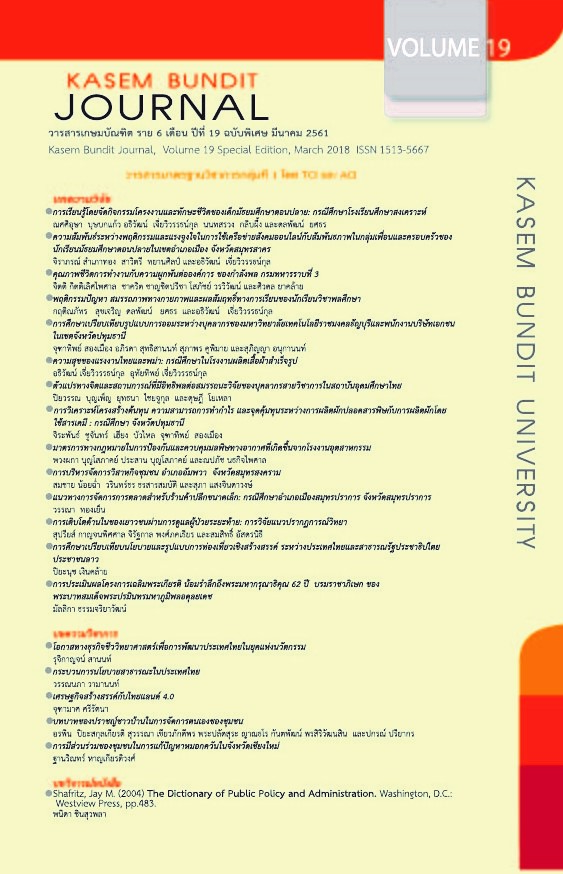การเรียนรู้โดยจัดกิจกรรมโครงงานและทักษะชีวิตของเด็กมัธยมศึกษาตอนปลาย : กรณีศึกษาโรงเรียนศึกษาสงเคราะห์
Keywords:
Project-Based Learning Outcomes, Life Skills, Welfare Education SchoolAbstract
การจัดการเรียนรู้ในรูปแบบกิจกรรมโครงงาน เป็นวิธีการหนึ่งที่จะช่วยพัฒนาผู้เรียน ทั้งด้าน ความรู้และทักษะชีวิต การวิจัยนี้เป็นแบบผสานวิธี มีการวิจัยทั้งเชิงปริมาณและเชิงคุณภาพ เพื่อศึกษา กิจกรรมโครงงานและทักษะชีวิตของเด็กมัธยมศึกษาตอนปลาย ของโรงเรียนศึกษาสงเคราะห์แห่งหนึ่ง เก็บข้อมูลเชิงปริมาณจากนักเรียนมัธยมศึกษาตอนปลาย แบบเจาะจง จ านวน 25 คน โดยใช้แบบวัด ทักษะชีวิตส าหรับนักเรียนชั้นมัธยมศึกษาตอนปลาย ผลการศึกษา พบว่า ค่าเฉลี่ยคะแนนทักษะชีวิตของ นักเรียนระดับชั้นมัธยมศึกษาตอนปลาย ทั้งชายและนักเรียนหญิงไม่แตกต่างกัน ค่าเฉลี่ยคะแนนทักษะ ชีวิตของนักเรียนทั้งสามระดับชั้นไม่แตกต่างกัน และ ค่าเฉลี่ยคะแนนทักษะชีวิตของนักเรียน สูงทั้ง 4 ด้าน สรุปได้ว่า กิจกรรมโครงงานช่วยพัฒนาทักษะชีวิตด้านการคิดวิเคราะห์ การตัดสินใจ และการแก้ปัญหา อย่างสร้างสรรค์ ส่วนปัจจัยที่ส่งผลให้เกิดทักษะชีวิต คือ สัมพันธภาพระหว่างครูกับนักเรียน
Learning management in project-based learning is one of the methods which helps learners develop knowledge and life skills. Qualitative and quantitative researches were designed to study project-based learning outcomes and life skills of high school students in a welfare education school. For quantitative approach, 25 high school students were selected using purposive sampling, and were given life skills test for high school students which consisted of four parts: self-awareness and value development, analytic thinking, decision making and creative problem solving, stress and emotion management, and relationship development. Results showed that: there were no significant differences between mean scores of life skills for both males and females high school students, mean scores of life skills test of all grades among high school students were not significantly different, and mean scores of life skills in four parts of the test were high. In conclusion, project - based learning was able to develop life skills in terms of analytic thinking, decision making, and creative problem solving. The relationship between instructors and student saffected life skills.
References
2. Dad ngam, Chuleeporn. (2555). Study ability usage Life Skills Main The Basic Education Core Curriculum B.E. 2551 Assumption College Primary Section. Thesis Master of Education, Program in Measurement and Evaluation, Srinakharinwirot University.
3. Katumarn, Panom. (2550). Adolescent Development. [Online], available from: https:// https://www.psyclin.co.th/new_page_56.htm. (17 June 2017).
4. Kamkliang, Kusumavadee. (2554). Basic Course Book of Basic Health Education 6. Bangkok: Aimphun.
5. Katz, Lilian and Chard, Sylvia. (2000). Engaging Children’s Minds: The Project Approach. (2nd Ed.) Stamford, CT: Ablex. [Online], Available from: https://www.projectapproach.org/store/.
6. Kliawthong, Sasiwimol. (2556). Some Factors Affecting to Life Skills of Mathayomsuksa V Students in the Secondary Education Service Office Area II. Veridian E-Journal Silpakorn University. Volume 6 No.3: Humanities, Social Sciences and Arts (September-December, 2013): 443-460.
7. Klomkaew, Monlada. (2555). A Construction Of Life Skills Test For High School. Journal of Graduate Studies Review Chulalongkorn University, Volume 8 No.3: 155-168.
8. Klomkaew, Monlada. (2555). A Construction Of Life Skills Test For High School. Master’s Thesis, Graduate School, Srinakharinwirot University.
9. Klongdee, Thitirat. (2559). The develolment of creative thinking project based leaning for undergraduate Students. The 6th Annual National Conference Phetchaburi Rajabhat research for territory Thailand Sustainable. 9 July 2016 at Phetchaburi Rajabhat University. Phetchaburi: Research Institute and Promote Art and Culture Phetchaburi Rajabhat University.
10. Kotawong, Suputtar. (2559). Promoting team working skills learning activities with STEM Education With cooperative learning of Matthayomsuksa 4 Chumphaesuksa School. 1st Documentation Conference Annual Report 2016 National Development Research to Serve the Society” 27 May 2016 at Academic and Graduate Services Building Kanchanaburi Rajabhat University. Kanchanaburi: Research and Development Institute Kanchanaburi Rajabhat University.
11. Laopidej, Apichai and Sirisampan, Orapin. (2556). THE Development of Learning Achievement and Creative Problem Solving Abilities on Social Problem in Thailand of Mathayomsuksa 6 Students by Problem-Based Learning Approach. Veridian E-Journal Silpakorn University. Volume 6 No.3: Humanities, Social Sciences and Arts (September-December, 2013): 757-774.
12. Makboon, Pornpan. (2555). Factors Contributing to School Skills of Male Children and Youths in the Department of Observation and Protection Regional Center of Juvenile Training School II, Ratchaburi Province. Master’s Thesis, Graduate School, Silapakorn University. Nakhon Pathom.
13. Office of the Basic Education Commission. (2554). Life Skills Development guidelines integration in The Basic Education Core Curriculum 2551. [Online], available from: https://www.un.ac.th/html/V_54 /K- M_book55/004.pdf. (29 April 2015)
14. Office of the Education Council. (2550). Project-Based Learning. Bangkok: The Agricultural Cooperative Federation of Thailand., Limited.
15. Office of the Permanent Secretary, Ministry of Education. (2554). Education Development Plan of Ministry of Education Eleventh Edition 2012 – 2016. Bangkok: Office of the Permanent Secretary Ministry of Education, Ministry of Education.
16. Pookiat, Ladda. (2552). Project-Based Teaching and Research Based Teaching: The Primary Teacher Work Done. Bangkok: Saha and Son Printing.
17. Porntrai, Supaporn. (2557). The Effects of Research-Based Learning on Grade-11 Students’ Desirable Characteristic Changing in Pohpanpunya Project. Journal of Research Unit on Science, Technology and Environment for Learning. Volume 5 No.22: 176-185.
18. Quality learning foundation. (2557). Conference proceedings Partnership in Creating a Learning Society for All “Disadvantaged Children The future of the Country”, 6-8 May 2557 at Muangthong Thani Nonthaburi. Bangkok: Quality Learning Foundation.
19. Reongrit, Nummon. (2553). Development of an Online Project Activity Model for Educational Programs for the Exchange of Learners in the Asia Pacific Region Through Collaborative Learning Methods to Improve Communication Skills and Interoperability Skills among Thai and Korean Learners. Nakhon Pathom: Silapakorn University.
20. Sukhin, Sangeamjit, Sirijirakarn, Veeravan J. and Graisakul, Graidetch. (2557). The Life Skills Development Model for the Secondary School Students in the Private School. Journal of Southern Technology. Volume 7 No.2 (July-December 2014): 1-8.
21. Suwanjutha, Supree. (2547). Family-Centered Care in Pediatric and Critical Care: Role of Nurse and Pediatricians. In Deerojanawong, Jitladda, Staworn, Dusit and Prapphal, Nuanchan. (Eds), Pediatric Respiratory Critical Care. (pp. 113-119). Bangkok: Beyond Enterprise.
22. Voracharoensri, Skol. (2550). A Study of Life Skills and a Training Group Model Construction for Developing Life Skills of Adolescent Students. Doctoral Dissertation. Graduate School, Srinakharinwirot University.
Downloads
Published
How to Cite
Issue
Section
License
ทัศนคติ ความคิดเห็นใด ๆ ที่ปรากฏในวารสารเกษมบัณฑิตฉบับนี้เป็นของผู้เขียน โดยเฉพาะ มหาวิทยาลัยเกษมบัณฑิตและบรรณาธิการ ไม่จำเป็นต้องมีความเห็นพ้องด้วย







